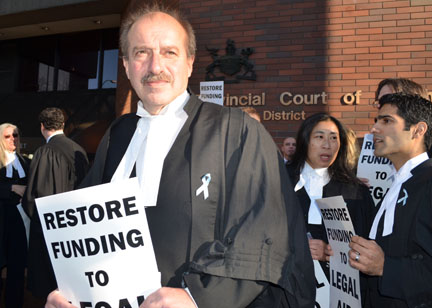The first wave of duty counsel withdrawals have begun in B.C. as lawyers step up their campaign against legal aid cuts in the province.

The Trial Lawyers’ Association of British Columbia says the system has faced $50 million in cuts over the last 20 years and faces the risk of collapse without a major infusion of cash.
“This decision wasn’t taken lightly,” says Rishi Gill, a Vancouver criminal lawyer who co-chairs the TLABC’s legal aid action committee. “But the only way we can seem to get the government’s attention is through sheer brute force. We’re now saying we’re fed up and we’ve had enough. The system is not functioning properly, and this is not tenable. It tells the government that we’re serious about addressing these shortfalls.”
In November 2011, lawyers from across the province
rallied to call for a boost to legal aid funding, staging simultaneous demonstrations in Vancouver, Victoria, Kamloops, and Penticton.
This week, they made their presence felt again as lawyers who normally take on legal aid cases refused to perform duty counsel services, such as representing people taken into custody soon after their arrest. In February, the job action escalates to the first two weeks of the month, then the first three weeks of March, before a complete withdrawal of services in April.
On Dec. 30, the province announced an extra $2.1 million in funding to the Legal Services Society, the legal aid provider in B.C. for family and child protection services, but Gill says that will not make a significant difference.
The TLABC claims the provincial government should be directing more of the $100 million it collects in provincial tax on legal fees towards legal aid, which they say was the original intention of the tax.
Gill says a lack of substantial investment by the government will provoke more job action, and that major legal aid cases could be next up for a potential boycott, as happened during Ontario’s legal aid boycott from 2009-2010.
“The first day was successful and we’re going strong. We’re going to remain united. If it doesn’t lead to some real change, it is going to be escalated further,” Gill says. “Continual underfunding of legal aid by the provincial government means access to justice for average people and the most marginal people in society is cut off.”

 The Trial Lawyers’ Association of British Columbia says the system has faced $50 million in cuts over the last 20 years and faces the risk of collapse without a major infusion of cash.
The Trial Lawyers’ Association of British Columbia says the system has faced $50 million in cuts over the last 20 years and faces the risk of collapse without a major infusion of cash.